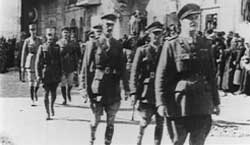PALESTINE, LAWRENCE AND THE ARABS

Britain experienced major reverses at Gallipoli and Kut because of poor leadership and staff-work, and the failure to take local conditions into account or respect Turkish military prowess. The British tried a different tactic in Arabia: using the Arabs themselves to rebel against the occupying Turks. They also had a man on the spot who combined the charisma to win the trust of the Arabs with the determination to harness them to the British cause.T E Lawrence -->had studied Crusader castles in the region prior to the outbreak of hostilities and spoke Arabic. When the war started, he was seconded to British intelligence in Palestine to provide liaison with the Arab peoples of the , an area of north-western Arabia. He quickly built a strong relationship with Hussein, sherif of Mecca, and one of his sons, Feisal.Lawrence's genius lay in his appreciation of the Arabs' guerrilla warfare skills and his penchant for the unconventional.'I think one company of Turks, properly entrenched in open country, would defeat the Sherif's armies... their real sphere is guerrilla warfare. They would dynamite a railway, plunder a caravan, steal camels better than anyone.'Inspired by Britain's vague promise of support for independence, the Hejaz Arabs rose up against their Ottoman overlords in June 1916, but the Revolt was neither popular nor particularly successful. Then Lawrence and the Arabs captured the port of Aqaba in July 1917, strengthening the Arab case for a role in Britain's push on Jerusalem. British forces entered Jerusalem in December - a hugely symbolic victory and key stage in the process of rolling back the Turks into their homeland.Sadly, the commitment that Britain made to France in relation to Syria through the Sykes-Picot Agreement meant that the promises made to the Hejaz Arabs regarding post-war independence were never honoured and, in 1932, the region was incorporated into the emerging kingdom of Saudi Arabia.ConclusionThe Germans had expected to be the dominant partner in any political relationship with the Turks, but the latter proved eminently capable of following their own objectives. The Ottoman Empire experienced mixed fortunes as a result of its involvement in the war. It had hoped to create a new empire in Central Asia but ended up by losing all its Middle Eastern territories. However, the Ottoman Empire - believed to be the 'sick man of Europe' - humiliated and embarrassed the Allies at Gallipoli and Kut.Significantly, the hoped-for jihad never materialised. Many Muslims were indifferent to the Sheikh-ul-Islam's call, and others, like the Hejaz Arabs, worked happily with the British. When a German delegation tried to incite the Emir of Afghanistan to attack the British in India, the Emir simply used this as a bargaining chip to extract further concessions from the British.

0 Comments:
Post a Comment
<< Home